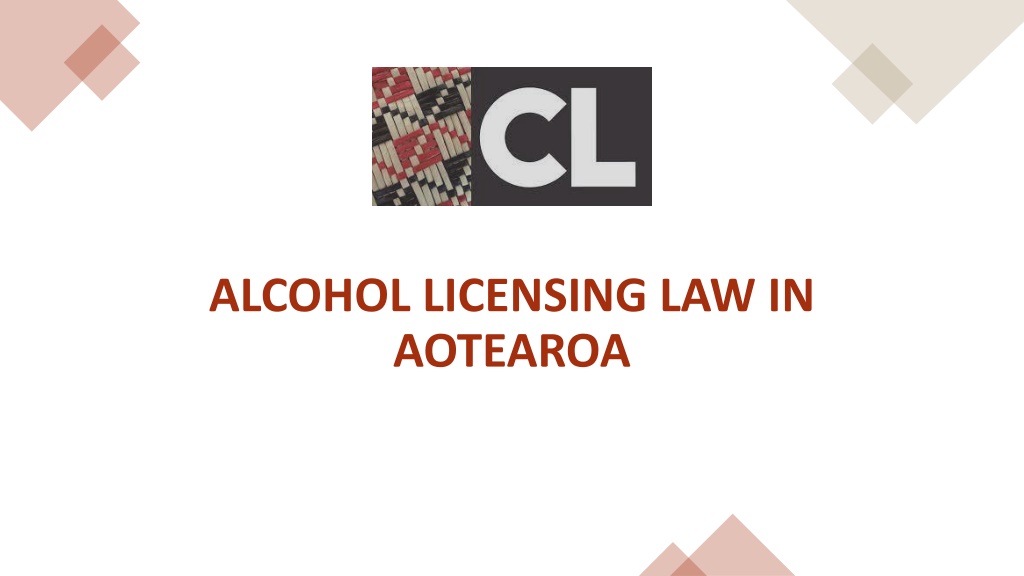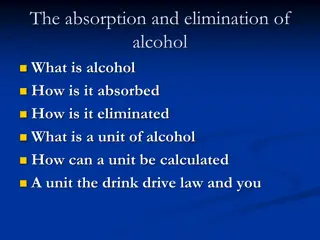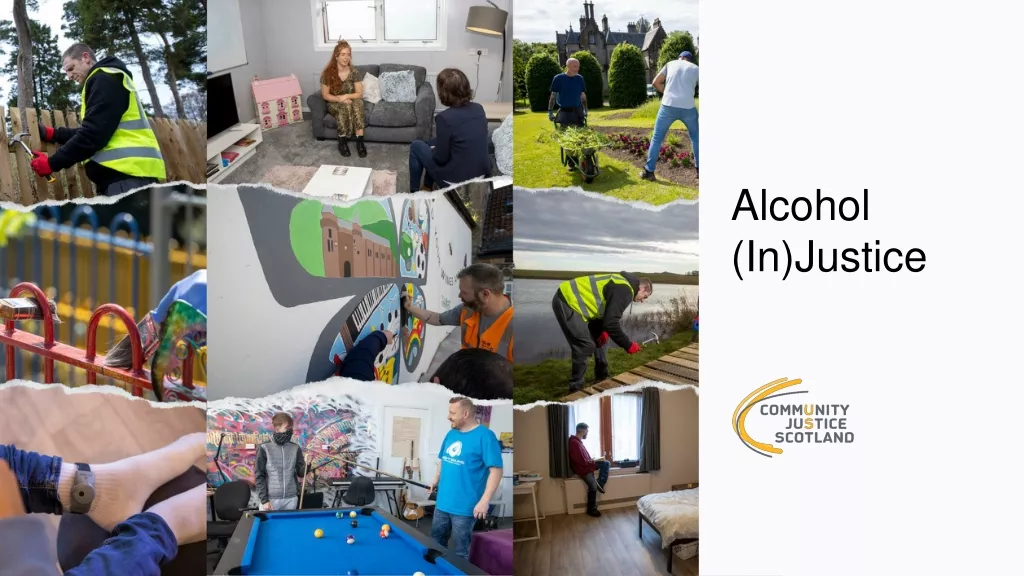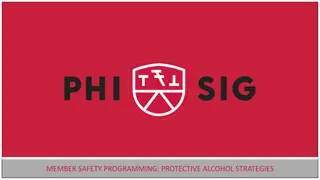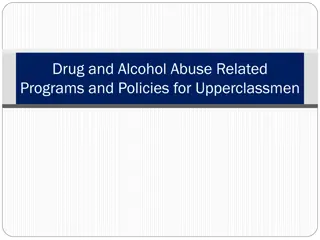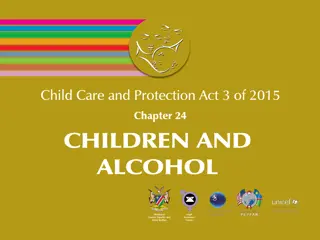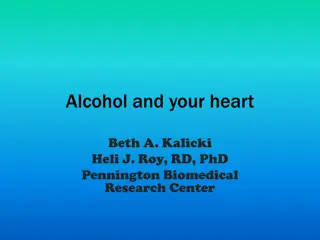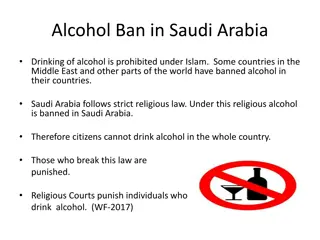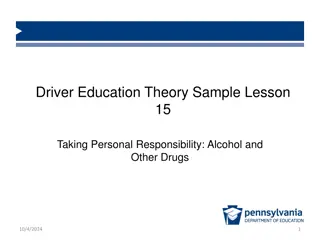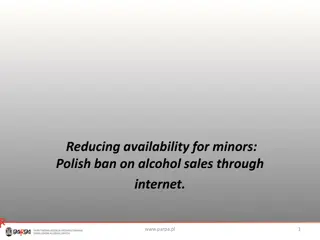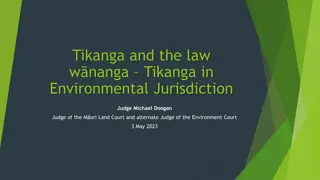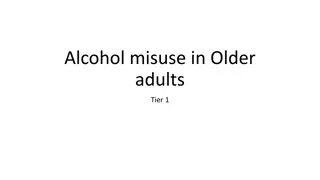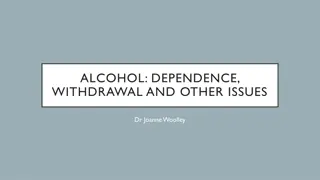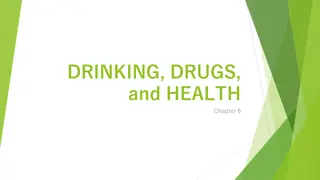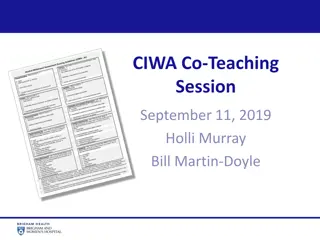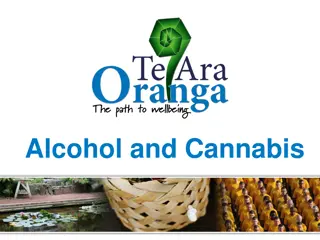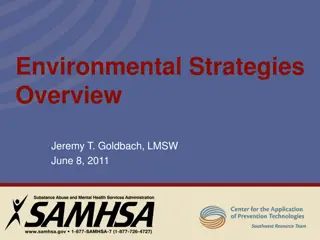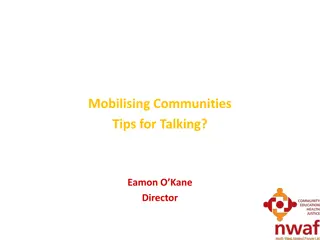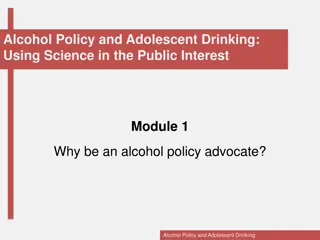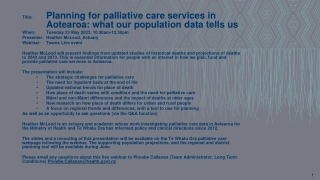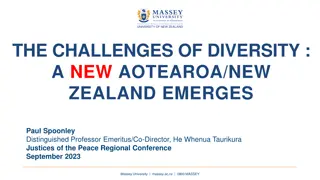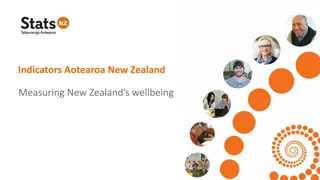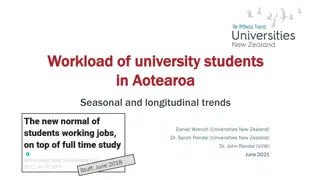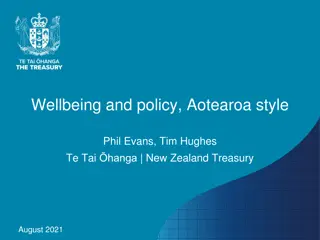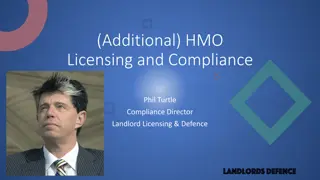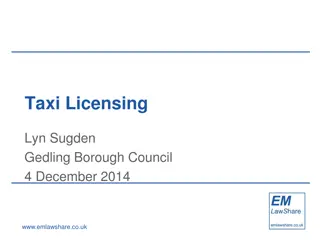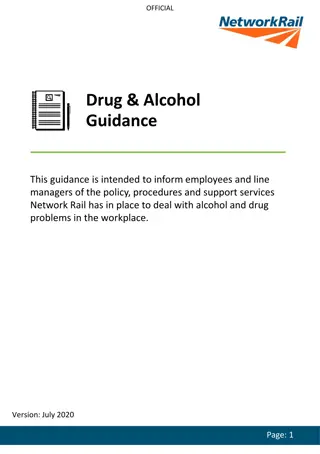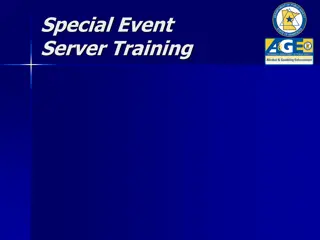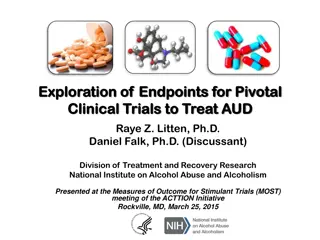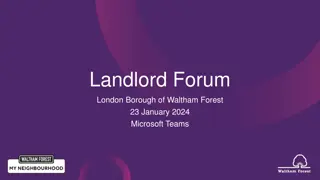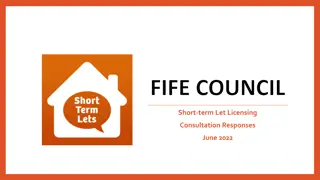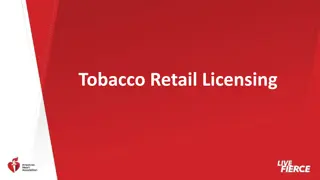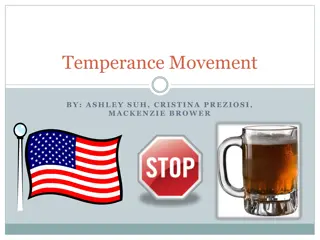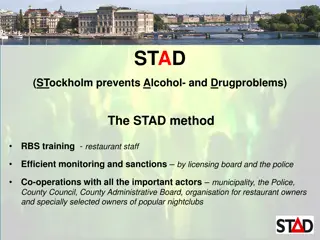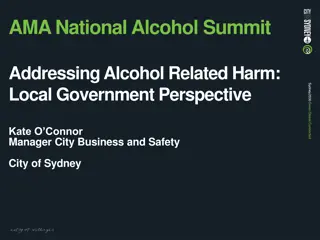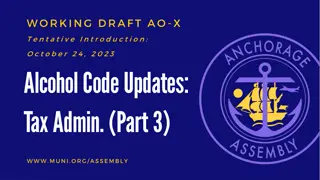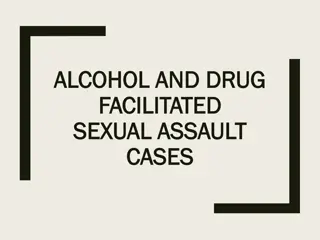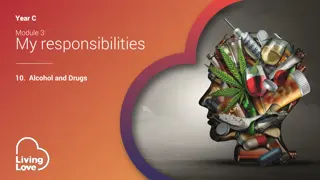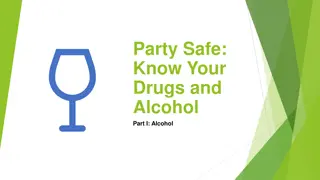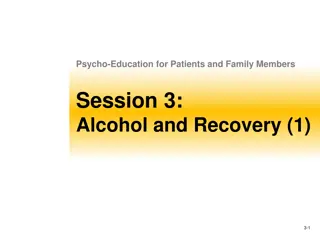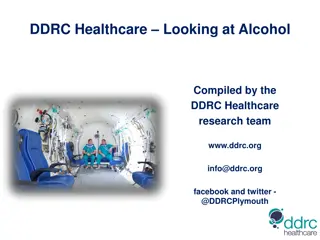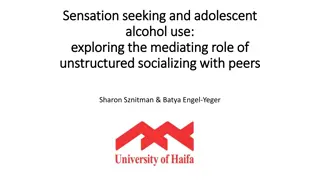Understanding Alcohol Licensing Laws in Aotearoa
Exploring the alcohol licensing laws in Aotearoa, this information covers aspects such as the role of Community Law Centres, the impact of licenses on public health and safety, types of licenses, how to object to a license application, and the objection process. It emphasizes community involvement in upholding regulations and ensuring responsible alcohol use.
Download Presentation

Please find below an Image/Link to download the presentation.
The content on the website is provided AS IS for your information and personal use only. It may not be sold, licensed, or shared on other websites without obtaining consent from the author. Download presentation by click this link. If you encounter any issues during the download, it is possible that the publisher has removed the file from their server.
E N D
Presentation Transcript
ALCOHOL LICENSING LAW IN AOTEAROA
These Community Law Centres have specialist available to support you and provide advice objecting to alcohol licences 1. Central Auckland 2. South Auckland 3. Waikato 4. Wellington & Hutt Valley 5. Canterbury & West Coast
What difference one licence can make South Waikato DLC Tokoroa, May 2023 It is clear to the Committee that the amenity and good area has improved after the previous operator ceased trading in 2021. The MOoH told us that from November 2020 to November 2021 alcohol ED admissions were 188 and 3 deaths when this store and Thirsty Liquor were operating. From November 2021 to November 2022 alcohol ED admissions dropped to 99 and 1 death when this store and Thirsty Liquor were not operating.
On-licence (bars/restaurants, caterers cannot take alcohol offsite) Off-licence (bottle stores/ supermarkets/ online retailers) New licence applications are for one year Licence renewals are for three years If a licenced premises is sold, the new owner must apply for a new licence, only the suitability of the applicant will be considered ALCOHOL LICENCES
How to Object to a Licence Application
THE PROCESS Applicant applies for licence and notifies public Hearing is held Objectors must appear at Hearing for evidence to be given weight and considered DLC will reserve decision on the day and later advise parties of decision and any conditions Reporting Agencies make enquiries on application and/or file reports Community has 25 working days to lodge Objection Notification is by a sign on the premises and notification in the local newspaper classifieds or Council website Evidence filed
OBJECTIONS Communities can object to licence applications under: - section 105 for new licences - section 131 for renewals, and WITHIN 25 WORKING DAYS OF NOTIFICATION 1. Provide contact details (name, email, phone, address) 2. Specify the grounds in the Act on which they object 3. Sign and date the objection
FURTHER CONTEXT DLCs want to hear why communities are concerned Communities can express real-life issues they may face which aren t captured with statistics or data Objections can discuss positive things in the community that could be negatively impacted or made worse Later in the process, if evidence is sensitive, a non-publication order can be requested to help protect privacy Community objectors can object to the licence being granted in its entirety AND ALSO request conditions be attached to it Objections only need to be a brief outline of concerns, which are expanded on later within evidence
OBJECTIONS DO NOT NEED TO provide detailed evidence confirm attendance at the hearing be sent to the applicant include any filing fees (participation is free for the community)
GROUNDS FOR OBJECTING S105 NEW LICENCES (a) the object of this Act: (b) the suitability of the applicant: (c) any relevant local alcohol policy: (d) the days on which and the hours during which the applicant proposes to sell alcohol: (e) the design and layout of any proposed premises: (f) whether the applicant is engaged in, or proposes on the premises to engage in, the sale of goods other than alcohol, low-alcohol refreshments, non-alcoholic refreshments, and food, and if so, which goods: (g) whether the applicant is engaged in, or proposes on the premises to engage in, the provision of services other than those directly related to the sale of alcohol, low-alcohol refreshments, non-alcoholic refreshments, and food, and if so, which services: (h) whether (in its opinion) the amenity and good order of the locality would be likely to be reduced, to more than a minor extent, by the effects of the issue of the licence: (i) whether (in its opinion) the amenity and good order of the locality are already so badly affected by the effects of the issue of existing licences that (i) they would be unlikely to be reduced further (or would be likely to be reduced further to only a minor extent) by the effects of the issue of the licence; but (ii) it is nevertheless desirable not to issue any further licences: (j) whether the applicant has appropriate systems, staff, and training to comply with the law: (k) any matters dealt with in any report from the Police, an inspector, or a Medical Officer of Health made under section 103.
GROUNDS FOR OBJECTING S131 LICENCE RENEWALS (a) the matters set out in paragraphs (a) to (g), (j), and (k) of section 105(1): (a) the object of this Act: (b) the suitability of the applicant: (c) any relevant local alcohol policy: (d) the days on which and the hours during which the applicant proposes to sell alcohol: (e) the design and layout of any proposed premises: (f) whether the applicant is engaged in, or proposes on the premises to engage in, the sale of goods other than alcohol, low-alcohol refreshments, non-alcoholic refreshments, and food, and if so, which goods: (g) whether the applicant is engaged in, or proposes on the premises to engage in, the provision of services other than those directly related to the sale of alcohol, low-alcohol refreshments, non-alcoholic refreshments, and food, and if so, which services: (j) whether the applicant has appropriate systems, staff, and training to comply with the law: (k) any matters dealt with in any report from the Police, an inspector, or a Medical Officer of Health made under section 103. (b) whether (in its opinion) the amenity and good order of the locality would be likely to be increased, by more than a minor extent, by the effects of a refusal to renew the licence: (c) any matters dealt with in any report from the Police, an inspector, or a Medical Officer of Health made by virtue of section 129: (d) the manner in which the applicant has sold (or, as the case may be, sold and supplied), displayed, advertised, or promoted alcohol.
THE OBJECT OF THE ACT Can object under this ground if they believe that the granting of the licence would: Promote unsafe or irresponsible sale, supply and consumption of alcohol Increase harm caused by the excessive or inappropriate consumption of alcohol in the community
SUITABILTY OF THE APPLICANT Objectors might not have knowledge of the applicant as a person; they should not pretend to. If the applicant runs other stores, Objectors may have knowledge of how well or poorly those operate Objections can be raised if the business plan and risk mitigation is poor Can object on this ground if it is felt the applicant has not made any (or enough) effort to engage with the community about their plans
AMENITY AND GOOD ORDER Can object to the application for a new licence if they believe that granting the licence would make the amenity and good order of the area materially worse, e.g. An increase in crime, vandalism, rubbish, noise issues or damage to property Services close by being impacted (such as places of worship, schools and m rae, parks, reserves, community halls, sports centres) Increases in traffic and parking problems Proximity to public transport (especially school age users) Objectors might feel the neighbourhood currently has a positive feel or that it is already unsafe. In either case they can raise concerns a new licenced premises would make it worse
AMENITY AND GOOD ORDER Renewal application Can object to an application for the renewal of an existing licence if they believe that declining the application would improve the amenity and good order of the area by a material amount, e.g. less crime, less rubbish and vandalism, less noise problems, people feeling safer and more able to go about their daily lives, less loitering, improved use
DAYS AND HOURS Can object if they believe the operating hours proposed by the applicant is inappropriate. Objectors can request conditions on the licence that could solve or mitigate the problem, e.g. the business is not open on certain days or shuts by a certain time, or between certain hours
DESIGN AND LAYOUT Can object if they believe the design and layout of the premises is inappropriate or may cause problems, e.g. if the layout may make the premises a target for burglaries, or if children could see into the shop. This includes advertising. They can object if the method of advertising could be harmful, e.g. if it promotes risky drinking through advertising low cost alcohol, RTDs or single sales. Objectors can request certain design or layout features not be allowed, or certain features are required, as a condition of the licence.
SALE OF OTHER GOODS AND SERVICES Can object if they believe the provision of other services alongside alcohol is inappropriate, e.g. if the store attracts young people (under 18s), it may not be appropriate to sell alcohol and whatever attracts the young people (say, confectionary) in the same store
STAFF AND SYSTEMS Can object if they believe the applicant does not have the necessary systems or enough (trained) staff in place to prevent alcohol related harm. Objectors need to be confident talking about business matters if they object on this ground. Does the applicant know who their market will be? How will they meet their needs? How will they ensure that there is no sale to minors? Will there be enough parking? What CCTV is there and what do they do with the footage? How many stores does the licence holder operate and can they give enough time the one being applied for?
LOCAL ALCOHOL POLICY The Council might have a local alcohol policy (LAP), which can usually be found on the Council website Can object to an application if they believe that it would breach the LAP. The DLC does not have to follow the LAP, but if you raise it, they usually will. Renewals can now also be objected to on this basis.
NEXT STEPS The Council will let you know that they have received your objection They will send copies of your Objection to the Applicant, Police and Medical Officer of Health
AGENCIES THAT REPORT OF LICENCE APPLICATIONS Council s Alcohol Licensing Inspector (must report) Medical Officer of Health (must make enquiries, may report) Police (must make enquiries, may report) Police or the Medical Officer of Health might not report if Noone opposes the application They feel there are no issues related to their area of expertise They do not have the resources, and feel a need to prioritise other alcohol licensing matters Can still object because of matters an agency could have dealt with, e.g. regular fights an objector witnessed outside premises, even though there was no police report to the licence application
OBJECTIONS NEED TO BE BACKED BY EVIDENCE You need to prepare what you will say at the hearing. Your evidence what you, and any witnesses that you call on, will say needs to be submitted. Do not try and introduce surprise evidence at the hearing. For Objections to carry weight they need to backed up with evidence and Objectors need to appear at the Hearing and speak to it, if they don t attend the Hearing the DLC will ignore their Objection. Evidence can take lots of forms; Stories about what goes on in the community already (good things and bad things) Stories about vulnerable individuals / groups they know about in the area Experiences in and around other bottle stores / licenced premises Stories of how good service providers have interacted with the community in the past They can talk anecdotally to relevant crime, nuisance and health matters they have seen in their neighbourhood Photos, videos or petitions can also be included to support concerns or provide evidence of harm.
PRIVACY Later in the process when you write your evidence/submissions you may have concerns that its content is sensitive and private to you or other people in your community. For example, you may have had alcohol addiction issues which feel relevant to your objection but which you would prefer not to discuss publicly You will have an opportunity to request a non-publication order from the DLC so your evidence can be heard without reference to your name
2022 2022 Licence Licence Application Statistics Application Statistics (on and off licences, new and renewals) 5,197 applications made 5,065 approved (97.46%) 226 objected to (4.35%) 160 opposed by reporting agencies (3.08%) 19 declined (0.37%) 113 withdrawn (2.17%)
Enacted now 1. LAPs appealed only by judicial review 2. Objectors will not have to justify their standing rights 3. DLCs may decline or impose conditions on licence renewals to align with LAPs 4. Community objectors have 25 working days to submit their objections REFORM 2023 CHANGES
Enacted May 2024 1. DLC hearings must avoid unnecessary formality 2. DLCs can only test evidence, cross- examination removed 3. DLC processes must incorporate Tikanga 4. Evidence can be given in te reo M ori Ministry of Justice will provide further information and guidance around these provisions in 2024 REFORM 2024 CHANGES
